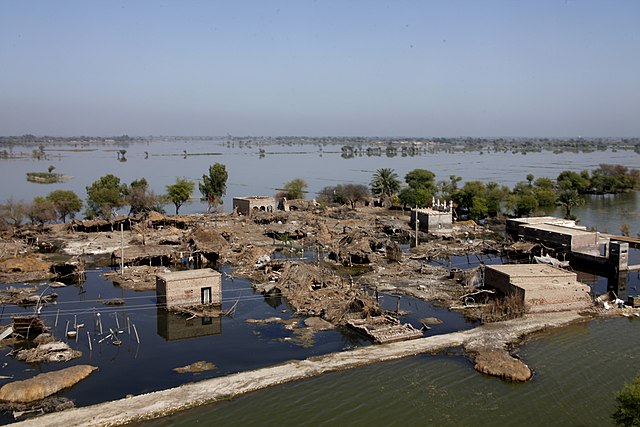Flooding in Pakistan Leaves Over 1000 Dead
Sophie Ulm
Staff Writer
Throughout Pakistan, millions of people are reeling from the losses caused by historic floods which, according to Al Jazeera, have led to over 1,300 deaths. Additionally, over 33 million people have been left homeless due to the damages, and many are bracing for a lack of food as floods have swept across farmlands and destroyed crops.
According to Reuters, the floods are a product of “record setting monsoon rains and glacier melt in Pakistan’s northern mountains.” In total, Pakistan has received almost 200 percent more rain than average in July and August, with Sindh, the nation’s hardest hit province, receiving 466 percent more rain than average. In total, the nation has received approximately 15.4 inches of rain in the past two months, leaving as much as a third of Pakistan estimated to be submerged. While some officials hope that the waters will recede in a matter of days, other officials do not agree.
Millions of Pakistanis fled their homes and are forced to live in makeshift tents on the side of the road. The Washington Post describes the tents as simple constructions, being made of small wooden poles and either a single piece of plastic or cloth hung from nearby branches. Many of these tents overlook the villages and supplies that had to be left behind, reminding people of the devastation that they must now do their best to recover from.
According to BBC News, there is an estimated $10 billion of damage already. To make matters worse, many people do not have the money to rebuild what they have lost. For many living in rural communities, the loss of their farm equipment and crop stores is just as devastating as the loss of their homes as they can no longer earn income. Unable to work, many are unsure how they will survive or provide for their households, many of which are multigenerational.
For the millions of Pakistanis living in tents and shelters across the nation, aid has been either rare or nonexistent. BBC News reports that even when aid workers arrive to locations with food, they often run out long before everyone is fed, and many locations do not receive any aid. One man from Sindh, Lawang, told The Washington Post that “We have been in these shelters for 16 days, but no one came to us.” Even the people inside of aid camps set up by the government have reported not receiving enough food or medical treatment, leaving the situation dire, and many without hope of a quick return to normalcy.
Sherry Rehman, Pakistan’s Climate Change Minister, told Reuters that she “does not believe the water would recede anytime soon.” Many Pakistanis view the floods as a result of man-made climate change, and the government holds that as such the rest of the world is obligated to help provide aid to the Pakistani people. The United Nations Secretary-General, Antonio Guterres, has launched a campaign to raise $160 million to help provide resources for some of the millions of displaced. Prime Minister Shehbaz Sharif believes that that amount needs “to be rapidly multiplied,” as many Pakistanis have been left without aid, though the government has also been criticized for not doing enough to provide aid to its people.


